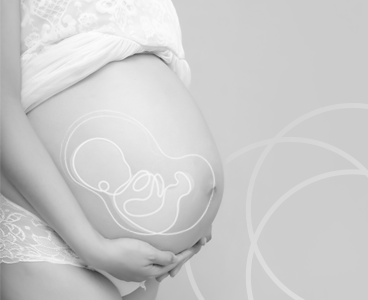
What is embryo adoption?
Embryo adoption is a technique that consists of gestating embryos that other couples have donated once they have achieved their pregnancy.
With Preimplantation Genetic Testing (PGT) we can study the genetic or chromosomal constitution of an embryo before transferring it to the uterus to detect if it has any alteration.
The PGT, consists of biopsy some cells of the embryo when it reaches its fifth day of embryonic culture, in the Blastocyst state. Cells of the so-called Trophectoderm are extracted. These cells are the ones that form the implant structures and the placenta. Cells of the so-called Internal Cellular Mass, which are the ones that form the fetus, are not extracted. With this cell we can make different variants of the PGT:
It must be taken into account that preimplantation genetic testing (PGT) is a partial study of the genetic material of several cells, so we can only provide information on what is studied in each case, not on the entire embryo.


You can learn more details about Preimplantation Genetic Testing, contact us without any commitment.

Embryo adoption is a technique that consists of gestating embryos that other couples have donated once they have achieved their pregnancy.
Gran Vía de les Corts Catalanes, 416A
08015 Barcelona – España
Telf. 93 254 60 70
E-mail: info@icefer.es
Gran Vía de les Corts Catalanes, 416B
08015 Barcelona – España
Telf. 93 240 40 60
E-mail: bancosemen@icefer.es
Governador montcada nº 13, bajos
25002 Lleida – España
Telf. 973 27 30 69
E-mail: lleida@icefer.es

© 2024 Instituto CEFER | Política de cookies | Administrar cookies | Política de privacidad y Aviso legal
| Cookie | Duration | Description |
|---|---|---|
| __cf_bm | This cookie, set by Cloudflare, is used to support Cloudflare Bot Management. | |
| __hssc | HubSpot sets this cookie to keep track of sessions and to determine if HubSpot should increment the session number and timestamps in the __hstc cookie. | |
| __hssrc | This cookie is set by Hubspot whenever it changes the session cookie. The __hssrc cookie set to 1 indicates that the user has restarted the browser, and if the cookie does not exist, it is assumed to be a new session. | |
| cookielawinfo-checkbox-advertisement | Set by the GDPR Cookie Consent plugin, this cookie records the user consent for the cookies in the "Advertisement" category. | |
| cookielawinfo-checkbox-analytics | Set by the GDPR Cookie Consent plugin, this cookie records the user consent for the cookies in the "Analytics" category. | |
| cookielawinfo-checkbox-functional | The GDPR Cookie Consent plugin sets the cookie to record the user consent for the cookies in the category "Functional". | |
| cookielawinfo-checkbox-necessary | Set by the GDPR Cookie Consent plugin, this cookie records the user consent for the cookies in the "Necessary" category. | |
| cookielawinfo-checkbox-others | Set by the GDPR Cookie Consent plugin, this cookie stores user consent for cookies in the category "Others". | |
| cookielawinfo-checkbox-performance | Set by the GDPR Cookie Consent plugin, this cookie stores the user consent for cookies in the category "Performance". | |
| CookieLawInfoConsent | CookieYes sets this cookie to record the default button state of the corresponding category and the status of CCPA. It works only in coordination with the primary cookie. | |
| elementor | The website's WordPress theme uses this cookie. It allows the website owner to implement or change the website's content in real-time. | |
| viewed_cookie_policy | The GDPR Cookie Consent plugin sets the cookie to store whether or not the user has consented to use cookies. It does not store any personal data. |
| Cookie | Duration | Description |
|---|---|---|
| wp-wpml_current_language | WordPress multilingual plugin sets this cookie to store the current language/language settings. |
| Cookie | Duration | Description |
|---|---|---|
| __hstc | Hubspot set this main cookie for tracking visitors. It contains the domain, initial timestamp (first visit), last timestamp (last visit), current timestamp (this visit), and session number (increments for each subsequent session). | |
| _fbp | Facebook sets this cookie to display advertisements when either on Facebook or on a digital platform powered by Facebook advertising after visiting the website. | |
| _ga | Google Analytics sets this cookie to calculate visitor, session and campaign data and track site usage for the site's analytics report. The cookie stores information anonymously and assigns a randomly generated number to recognise unique visitors. | |
| _ga_* | Google Analytics sets this cookie to store and count page views. | |
| _gat_UA-* | Google Analytics sets this cookie for user behaviour tracking. | |
| _gcl_au | Google Tag Manager sets the cookie to experiment advertisement efficiency of websites using their services. | |
| _gid | Google Analytics sets this cookie to store information on how visitors use a website while also creating an analytics report of the website's performance. Some of the collected data includes the number of visitors, their source, and the pages they visit anonymously. | |
| CONSENT | YouTube sets this cookie via embedded YouTube videos and registers anonymous statistical data. | |
| hubspotutk | HubSpot sets this cookie to keep track of the visitors to the website. This cookie is passed to HubSpot on form submission and used when deduplicating contacts. |
| Cookie | Duration | Description |
|---|---|---|
| IDE | Google DoubleClick IDE cookies store information about how the user uses the website to present them with relevant ads according to the user profile. | |
| test_cookie | doubleclick.net sets this cookie to determine if the user's browser supports cookies. | |
| VISITOR_INFO1_LIVE | YouTube sets this cookie to measure bandwidth, determining whether the user gets the new or old player interface. | |
| YSC | Youtube sets this cookie to track the views of embedded videos on Youtube pages. | |
| yt-remote-connected-devices | YouTube sets this cookie to store the user's video preferences using embedded YouTube videos. | |
| yt-remote-device-id | YouTube sets this cookie to store the user's video preferences using embedded YouTube videos. | |
| yt.innertube::nextId | YouTube sets this cookie to register a unique ID to store data on what videos from YouTube the user has seen. | |
| yt.innertube::requests | YouTube sets this cookie to register a unique ID to store data on what videos from YouTube the user has seen. |
| Cookie | Duration | Description |
|---|---|---|
| _cfuvid | Description is currently not available. | |
| VISITOR_PRIVACY_METADATA | Description is currently not available. |